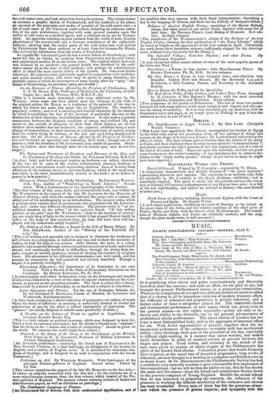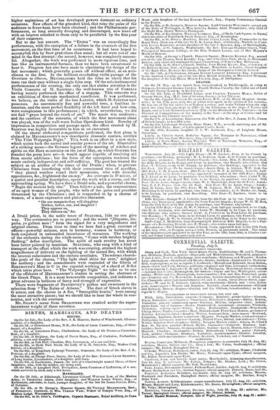MUSIC.
EIGHTH PHILHARMONIC CONCERT—MONDAY, JULY 8.
PAST I.
Sinfonia Eroica BEETHOVEN. Song. MS. " Ach Herr," Herr STAUDD1L NICOLAI, Trio, Two Violoncellos and Double Bass, Mr. LINDLEY,
Mr. LUCAS, and Mr. HOWELL COSELLI. Scene from As You Like It, Miss A. WILLIAMS, Miss
Doter, Mr. ALLEN, and Herr STAIIDIOL, with Chorus. H. SMART. PART II.
The First Walpurgis Night, Miss DOLBY, Mr. ALLEN, and Herr STAUDIOL, with Chorus (first time of performance in this country) MENDELSSOHN BARTHOLDY;
Concerto, Vilnin, M. SAorros SAINTON. A Selection from the " Ruins of Athens," Miss A. WIL- LIAMS and Herr STAMM:IL, with Chorus, MS. (fast
time of performance in this country) BEETHOVEN. Overture to Oberon C. M. von WzRER. Leader, Mr. T. Cooxe—Conductor, Dr. F. MENDELSSOHN BARTHOLDY.
IT is gratifying when labour and pains conscientiously and discreetly bestowed meet due success ; and such an effort, we are glad to say, has brought the present Philharmonic season to a prosperous termination. When to the complexity of new and very difficult orchestral music is added that of a chorus in all its hazardous varieties of modern dramatic effect, the difficulty of rehearsal and preparation is greatly enhanced, and a higher stake of fame is altogether played for. The admirable choral and instrumental performance of new music which has given éclat to the present season—to two nights especially—points not only to in- dustry and ability in the direction, but to the general advancement of professional choral performance. The select chorus of London has be- come a most distinguished body, and in the aggregate of immense effect for art. With fewer opportunities of practice together than the in- strumental performers of the orchestra—certainly with less mechanical ability—they discharge their part in the novelties of the day, especially in difficult sight-reading, in a manner that raises wonder, and makes small distinction in point of musical culture at present between the singer and player. Good voices, and certainty in the attack of the note, have given to twenty or thirty singers at the Philharmonic the effect of the Exeter Hall chorus. Concerted pieces that would formerly have required, at the usual rate of theatrical preparation, long weeks of rehearsal, are now brought to a hearing in a complete and finished state in as many hours. In Dr. MENDELSSOHN the Philharmonic Society has had a conductor very naturally anxious to give a favourable first impression of his compositions ; but we will do him the justice to say, that he has shown the same zeal for others—from his friend and countryman SPOHE down to the greenest composer of Young England. Besides the actual labour that he has bestowed in preparing the concerts, the influence of his presence in working the difficult machinery of the orchestra and chorus has been wonderful. Every man of them has felt the generous stinut- lant which the presence of genius imparts ; and sympathy with the
higher aspirations of art has developed powers dormant on ordinary occasions. New effects of the grandest kind, that raise the pulse of the audience to fever-heat, have been obtained ; and the Philharmonic per- formances, so long annually drooping and discouraged, now leave off with an interest attached to them only to be paralleled by the first year of their existence.
But to the last concert. The "Eroica " was an exceedingly fine performance, with the exception of a failure in the crescendo of the first movement, on the first time of its occurrence. It had been hoped to accomplish this by finer gradations than usual ; but all were not of one mind in the first attempt : the second, however, was completely success- ful. Altogether, the work was performed in more rigorous time, and less like an instrumental fantasia, than we have been accustomed to hear it. Progress has also been made in elucidating the design of the last movement ; which generally passes off without effect, as an anti- climax to the first. In the brilliant concluding violin passage of the Overture to Oberon, MENDELSSOHN held the reins so nicely that his team ran their race without a single false step. Of the solo instrumental performances of the evening, the only one that claims attention is the Violin Concerto of M. SAINTON ; the well-known trio of V
-ORELLI
having merely performed the office of a stopgap. This concerto was an exhibition of first-rate mechanical excellence. It was performed, we believe, on the violin of the late LAFONT, which M. SAINTON now possesses. An uncommonly fine and powerful tone, a faultless in- tonation, and the most perfect flexibility of the left hand and bow-arm, were conspicuous in this performance ; in which, nevertheless, we did not find " grace beyond the reach of art." The music was mediocre ; and the cantilena of the concerto, of which the first movement alone was played, was of the well-worn Italian Operahouse kind. Novelty of impression in composition and passage apart, the effect created by M. SAINTON was highly favourable to him as an executant. Of the choral orchestral compositions performed, the first place is claimed by MENDELSSOHN'S new descriptive dramatic cantata, entitled " The First Walpurgis Night." This work is an effort in a new style, which unites both the sacred and secular powers of the art. Illustrative of a striking scene—the German legend of the meeting of witches and spirits on the Harz mountains on the 1st of May, on which GOETHE has founded the poem here set—it would appear capable of receiving aid from scenic additions ; but the force of the conception rendered the music entirely independent and self-sufficing. The poet has treated the subject as an artifice of the times of the Druids ; when, to prevent Christians from interfering with their accustomed rites of sacrifice, " they placed watches round their mountains, who with dreadful appearances, &c., frightened the enemy." An overture in D minor, of a quaint and peculiar description, opens the work with a storm, and the approaching spring. We have then a Druid solo, and a powerful chorus, " Begin the ancient holy rite." Then follows a solo, the remonstrance of an aged woman of the people, who tells of the pains and penalties threatened by the Christians ; and is responded to by a chorus of women, of a most expressive and plaintive character.
" On our ramparts they will slaughter
Mother, father, son, and daughter !
They oppress us,
They distress us," &c.
A Druid priest, in the noble tones of STAUDIGL, bids no one give way. The ceremonies are to proceed ; and the words ":Disperse, dis- perse, ye gallant men I " form the signal for a very magnificent and original chorus. From time to time we here find a great contrast of effects—powerful unisons, men in harmony, women in harmony, or both conjoined in unbounded luxuriance of resources. The working of the orchestra during the witch-scene, " Come with torches brightly flashing," defies description. The spirit of such revelry has never been better painted by musician. STAUDIGL, who sang with a kind of transport at the effect which the work was creating, attained the highest magnificence of delivery on the lighting of the sacred fire, with which the interest culminates and the cantata concludes. The solemn church- like peals of the chorus, "Thy light shall shine for ever," delighted the auditory ; and the connoisseurs were reminded of the Gloria of BEETHOVEN'S Mass in C in the especial working of a chord of B flat which takes place here. " The Walpurgis Night " we take to be one of the offshoots of MENDELSSOHN'S studies in setting the choruses of the Greek Plays. It is a most honourable composition, and indicates a great advance in boldness of fancy and strength of expression. There were fragments of BEETHOVEN'S pathos and sweetness in the selection from " The Ruins of Athens." The duet of Greek slaves in G minor, and the chorus in A flat, " Susceptible hearts," were among the most attractive pieces ; but we should like to hear the whole in con- nexion, and with the overture. Mr. SMART'S scene from SHAKSFERE was crushed under the super- incumbent weight of these novelties.



























 Previous page
Previous page